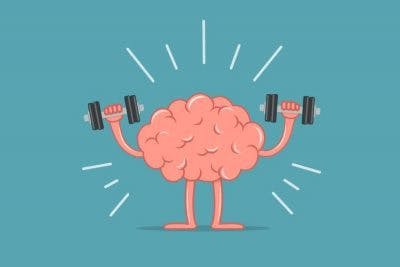Fish oil therapy is an excellent way to boost cognitive function after brain injury.
You’re about to learn the many health benefits of fish oil therapy for brain injury patients. You’ll also learn what to look for when buying fish oil supplements. Let’s get started!
Why Try Fish Oil Therapy for Brain Injury
To understand how fish oil can help mitigate the effects of traumatic brain injury, let’s examine what happens to the brain during a TBI.
After a sudden impact to the skull, the delicate balance of ions and chemicals in the brain is altered. This imbalance causes, among other things, the overproduction of free radicals. When these free radicals interact with brain cells, they trigger a phenomenon known as oxidative stress.
Oxidative stress damages the structure of brain cells and causes inflammation and cell death. This leads to many of the symptoms associated with traumatic brain injury.
In a healthy person, the brain would produce antioxidants to counter the effects of oxidative stress. But after a TBI, the brain cannot produce enough to protect itself.
Fortunately, fish oil can provide protection from oxidative stress and reduce the damage inflammation causes.
How Fish Oil Helps Brain Injury Recovery

The primary component of fish oil, the part that matters most for brain health, are omega-3 fatty acids.
Unlike most fats, omega-3 fatty acids are not stored as extra energy but instead are used directly in important bodily processes, including brain function.
There are two main types of omega-3 fatty acids:
- Long-chain omega-3 fatty acids, also known as EPA and DHA.
- Short-chain omega-3 fatty acids, also known as ALA.
The long-chain acids are the ones contained in fish oil. They are also more easily absorbed by the body and are therefore more useful for brain injury patients.
Benefits of Fish Oil Therapy for Brain Injury
Omega-3s are some of the most helpful supplements you can take for overall brain health. The following are several benefits that long-chain omega-3s found in fish oil can offer for brain injury patients:
1. Reduces Inflammation
As mentioned above, omega-3 plays a critical role in reducing the inflammation response that occurs in the brain as a result of free radicals.
The EPA and DHA acids trigger the production of molecules called protectins and resolvins, which restore brain tissue and protect it from oxidative stress.
By reducing inflammation, fish oil can thus help the brain heal faster, making it an excellent therapy for brain injury patients.
2. Improves Normal Brain Function

Besides reducing inflammation, omega-3 also improves communication between brain cells. This allows the brain to work faster, which leads to a boost in cognitive function.
In fact, in one placebo-controlled study, patients who took 2000 mg of omega-3 fish oil per day performed significantly better on cognitive tests than those who did not take omega-3.
These patients especially showed improvements in executive function and memory, two areas that brain injury patients particularly struggle with.
This makes fish oil a great potential therapy for brain injury.
3. Boosts BDNF
Finally, omega-3 helps boost the level of BDNF in the brain.
BDNF is one of the most important proteins found in the brain. It acts as a neurotrophic growth factor, meaning it helps trigger the production of new brain cells.
This has huge implications for brain injury recovery since growing new neurons can drastically improve a person’s cognitive function.
But that’s not the only thing BDNF does. It also serves as a neuromodulator, which means it enhances the excitatory and inhibitory responses of receptors in the brain.
All this makes fish oil an excellent supplement for brain injury patients.
How to Get the Most Benefits from Fish Oil for TBI

The benefits you can get from fish oil therapy for brain injury will depend on a few factors. One of these factors is your diet.
That’s because there is another type of fatty acid that is found in many of the processed foods that we consume in a western diet. This acid, called omega-6, is a pro-inflammatory, and cancels out most of the benefits of omega-3.
To get the most cognitive benefits from fish oil, the ratio of omega-6 to omega-3 should be 1:1. However, scientists estimate that most people in western, developed nations consume a ratio of about 16:1. This drastic imbalance means that most people do not receive many benefits from fish oil supplements.
The vast majority of omega-6 in our diet comes from processed seed and vegetable oils. These include soybean oil and sunflower oil. Therefore, you’ll want to avoid using those oils when cooking, or eating processed food that contains them.
When you lower your omega-6 consumption, the omega-3 you get from fish oil will have a much more noticeable effect.
How Much Fish Oil Should You Take?

The dosage you take will make a difference in how many benefits you see from fish oil therapy for your brain injury.
In general, the more milligrams you take, the better the results. Still, there is a limit. The daily recommended dose is about 500 mg. However, when shopping for fish oil, keep in mind that most brands will mix in other ingredients.
This means that just because the label on a bottle says it has 1200 mg of fish oil inside doesn’t mean it contains that many milligrams of omega-3, which is the most crucial part. Instead, read the label to see how many grams of DHA each capsule holds. This will tell you how much omega-3 you will receive in each dose.
Using Fish Oil for Brain Injury
While there is no instant cure for brain injury, there are ways to optimize your brain’s natural healing mechanisms. And one of the best supplements to encourage that is fish oil.
The more omega-3 you consume, the more your brain can generate new brain cells and improve communication between neurons.
We hope this article inspires you to give fish oil therapy a try and boost your brain injury recovery.
Featured Image: iStock/Zbynek Pospisil














